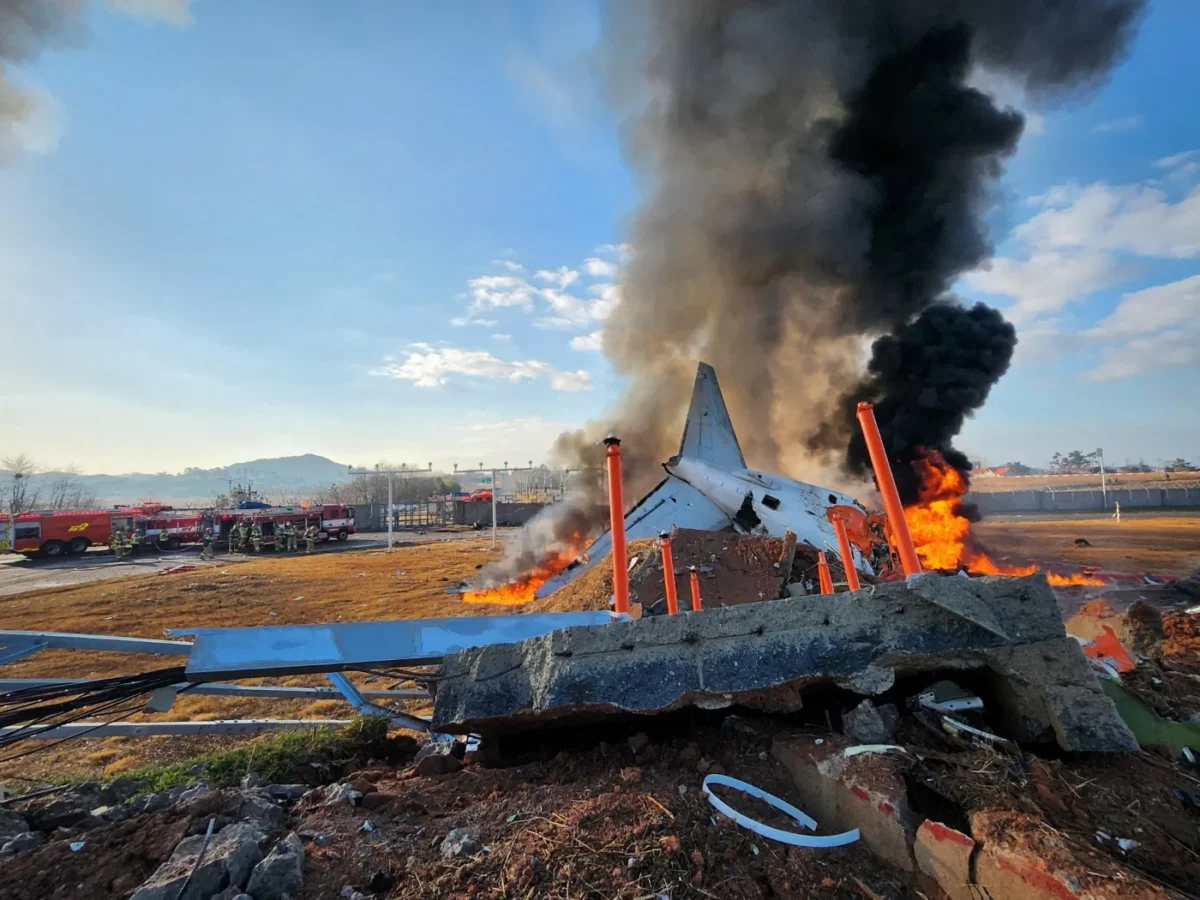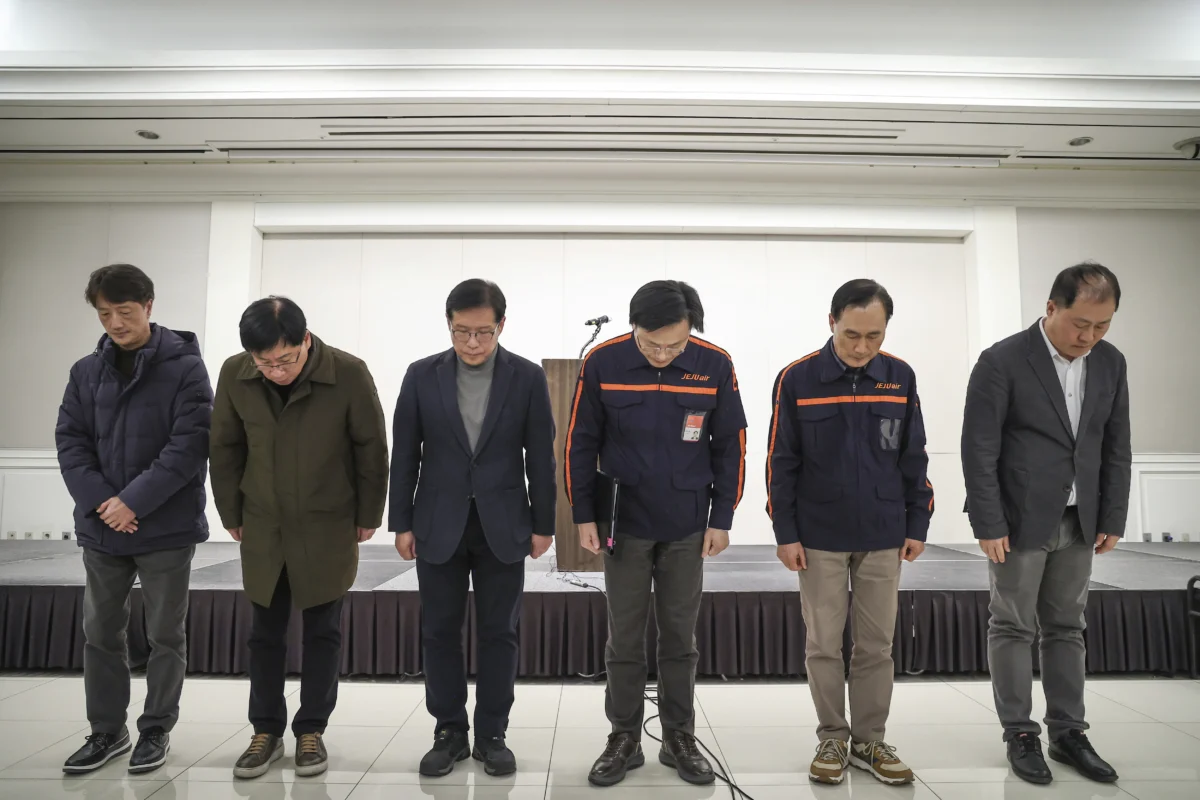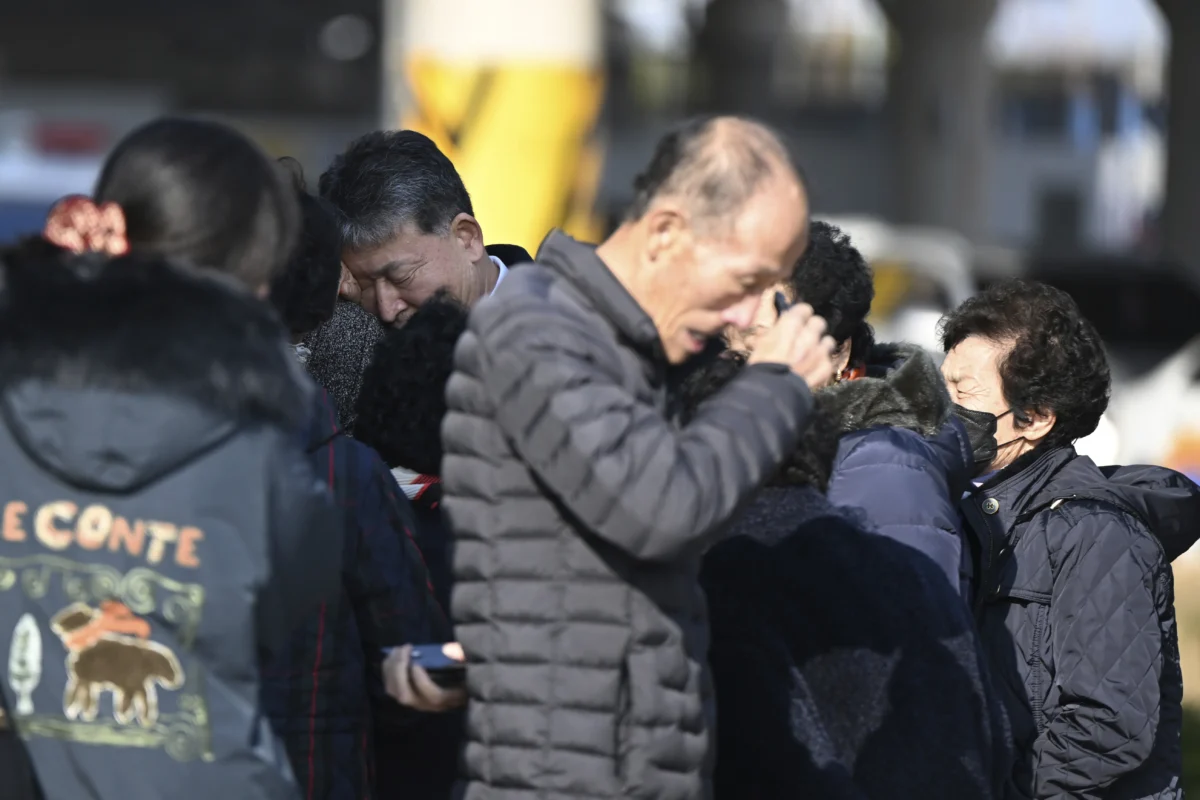A passenger plane skidded off a runway at a South Korean airport Sunday, slammed into a concrete fence and burst into flames after its front landing gear apparently failed to deploy. All but two of the 181 people on board died in one of the country’s worst aviation disasters.
The Jeju Air plane crashed while landing in the town of Muan, about 180 miles south of Seoul. The Transport Ministry said the plane was a 15-year-old Boeing 737-800 jet that had arrived from Bangkok and that the crash happened at 9:03 a.m.
A total of 179 people—85 women, 84 men and 10 others whose genders weren’t immediately identifiable—died in the fire, the South Korean fire agency said. Emergency workers pulled two people, both crew members, to safety. Health officials said they are conscious and not in life-threatening condition.
Among the 177 bodies so far found, officials have so far identified 88 of them, the fire agency said. The passengers were predominantly South Korean, as well as two Thai nationals. Thailand’s Foreign Ministry said its embassy in Seoul received confirmation from South Korean authorities that the two Thai passengers were among the fatalities.
The fire agency deployed 32 fire trucks and several helicopters to contain the fire. About 1,560 firefighters, police officers, soldiers and other officials were also sent to the site, it said.
Footage of the crash aired by YTN television showed the Jeju Air plane skidding across the airstrip, apparently with its landing gear still closed, and colliding head-on with a concrete wall on the outskirts of the facility. Other local TV stations aired footage showing thick plumes of black smoke billowing from the plane, which was engulfed in flames.

Lee Jeong-hyeon, chief of the Muan fire station, told a televised briefing that the plane was completely destroyed, with only the tail assembly remaining recognizable among the wreckage.
Transport Ministry officials later said their early assessment of communication records show the airport control tower issued a bird strike warning to the plane shortly before it intended to land and gave its pilot permission to land in a different area. The pilot sent out a distress signal shortly before the plane went past the runway and skidded across a buffer zone before hitting the wall, the officials said.
Senior Transport Ministry official Joo Jong-wan said workers have retrieved the flight data and cockpit voice recorders of the plane’s black box, which will be examined by government experts investigating the cause of the crash and fire. Joo said the runway at the Muan airport will be closed until Jan. 1.
Emergency officials in Muan said the plane’s landing gear appeared to have malfunctioned.
The Transport Ministry said the plane’s passengers include two Thai nationals.
Thailand’s prime minister, Paetongtarn Shinawatra, expressed deep condolences to the families of those affected by the accident in a post on social platform X. Paetongtarn said she ordered the Ministry of Foreign Affairs to provide assistance immediately.
Kerati Kijmanawat, the director of the Airports of Thailand, confirmed in a statement that Jeju Air flight 7C 2216 departed from Suvarnabhumi Airport with no reports of abnormal conditions with the aircraft or on the runway.
Jeju Air in a statement expressed its “deep apology” over the crash and said it will do its “utmost to manage the aftermath of the accident.”
In a televised news conference, Kim E-bae, Jeju Air’s president, deeply bowed with other senior company officials as he apologized to bereaved families and said he feels “full responsibility” for the incident. Kim said the company hadn’t identified any mechanical problems with the aircraft following regular checkups and that he would wait for the results of government investigations into the cause of the incident.

Boeing said in a statement on X it was in contact with Jeju Air and is ready to support the company in dealing with the crash.
“We extend our deepest condolences to the families who lost loved ones, and our thoughts remain with the passengers and crew,” Boeing said.
‘My Last Words’
Hours after the crash, family members gathered in the airport’s arrival area, some crying and hugging as Red Cross volunteers handed out blankets.
Families screamed and wept loudly as a medic announced the names of victims identified by their fingerprints. Papers were circulated for families to write down their contact details.
One relative stood at a microphone to ask for more information from authorities. “My older brother died and I don’t know what’s going on,” he said. “I don’t know.”
Another asked journalists not to film. “We are not monkeys in a zoo,” he said. “We are the bereaved families.”

Mortuary vehicles lined up outside to take bodies away, and authorities said a temporary morgue had been established.
The crash site smelled of aviation fuel and blood, according to Reuters witnesses, and workers in protective suits and masks combed the area while soldiers searched through bushes.
A passenger texted a relative to say a bird was stuck in the wing, the News1 agency reported. The person’s final message was, “Should I say my last words?”
The aircraft was manufactured in 2009, the transport ministry said.
The two CFM56-7B26 engines were manufactured by CFM International, a joint venture between GE Aerospace and France’s Safran, the transport ministry said.
A CFM spokesperson said, “We are deeply saddened by the loss of Jeju Air flight 2216. We extend our heartfelt sympathies to the families and loved ones of those on board.”
Challenge Hits South Korea’s Interim President
It’s one of the deadliest disasters in South Korea’s aviation history. The last time South Korea suffered a large-scale air disaster was in 1997, when a Korean Airline plane crashed in Guam, killing 228 people on board. In 2013, an Asiana Airlines plane crash-landed in San Francisco, killing three and injuring approximately 200.
Sunday’s accident was also one of the worst landing mishaps since a July 2007 crash that killed all 187 people on board and 12 others on the ground when an Airbus A320 slid off a slick airstrip in Sao Paulo and collided with a nearby building, according to data compiled by the Flight Safety Foundation, a nonprofit group aimed at improving air safety. In 2010, 158 people died when an Air India Express aircraft overshot a runway in Mangalore, India, and plummeted into a gorge before erupting into flames, according to the safety foundation.
It is the first fatal flight for Jeju Air, a low-cost airline founded in 2005 that ranks behind only Korean Air Lines and Asiana Airlines in terms of the number of passengers in South Korea.
The accident happened only three weeks after Jeju Air started regular flights from Muan to Bangkok and other Asian cities on Dec. 8.
Muan International is one of South Korea’s smallest airports but it has seen the number of international passengers jump nearly 20 times to 310,702 from January to November from the same period in 2022, according to government data.
All domestic and international flights at Muan airport had been cancelled, Yonhap reported.
The incident came as South Korea is embroiled into a huge political crisis triggered by President Yoon Suk Yeol’s imposition of martial law and ensuing impeachment. Last Friday, South Korean lawmakers impeached acting President Han Duck-soo and suspended his duties, leading Deputy Prime Minister Choi Sang-mok to take over.
Choi arrived at the scene of the accident and said the government was putting all its resources into dealing with the crash.
Yoon’s office said his chief secretary, Chung Jin-suk, will preside over an emergency meeting between senior presidential staff later on Sunday to discuss the crash.
The Associated Press and Reuters contributed to this report.
